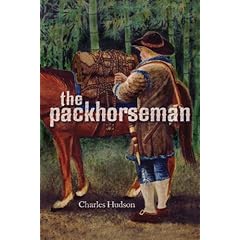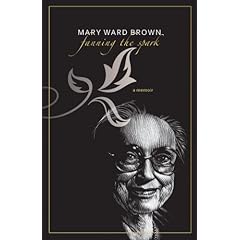Both Charles Hudson's The Packhorseman and Mary Ward Brown's Fanning the Spark were published earlier this year by The University of Alabama Press; they were catalogued at the library here last month.
I read Mary Ward Brown's first story collection in the late 80s and have considered myself a Brown fan ever since. I look forward to reading her memoir. Hudson I've not heard of before, but the bio on the back cover says he's an emeritus professor of anthropology and history from the University of Georgia and a scholarly writer.
 According to Amazon:
According to Amazon:In April 1735, twenty-year-old William MacGregor, possessing little more than a bottle of Scotch whiskey and a set of Shakespeare’s plays, arrives in Charles Town, South Carolina, to make his fortune in the New World. The Scottish Highlands, while dear to his heart, were in steep economic decline and hopelessly entangled in dangerous political intrigue. With an uncle in Carolina, the long ocean voyage seemed his best chance for a new start. He soon discovers that the Jacobite politics of Scotland extend to Carolina, and when his mouth gets him in trouble with the Charles Town locals, dimming his employment opportunities, he seizes the one option still open for him and takes a job as a frontier packhorseman.
Soon young MacGregor is on the Cherokee trail to Indian country, where he settles in as a novice in the deerskin trade. Along the way William learns not only the arts of managing a pack train and trading with the Indians, but of reading the land and negotiating cultural differences with the Cherokee—whose clan system is much different from the Scottish clans of his homeland. William also learns that the Scottish enlightenment he so admires has not made much headway in the Carolina backcountry, where the real challenges are to survive, day to day, during the tense times after the Yamasee War and to remember that while in Indian country . . . it is their country.
A scholar of the native Southeast, Charles Hudson has turned his hand to this work of historical fiction, bringing to life the packhorsemen, Indian traders, and southeastern Indians of the early 18th-century Carolina. With a comfortable and engaging style, Hudson peoples the Carolina frontier with believable characters, all caught up in a life and time that is historically well-documented but little-known to modern popular readers.
 Again, from Amazon:
Again, from Amazon:In 1986, after years of publishing stories in literary magazines and periodicals, Mary Ward Brown published her first book, the story collection Tongues of Flame. It soon received regional and national attention, and the following year won the PEN/Hemingway Award for fiction. Mary Ward Brown was sixty-nine years old. Though she would go on to write and publish many more stories and a well-received second collection, It Wasn’t All Dancing, Mary Ward Brown’s late acclaim hardly hints at the rich and varied life that prepared the way for her success. Fanning the Spark is the story of her life as a writer—her upbringing in rural Alabama; the joys of college, marriage, and motherhood; the sorrows of becoming a widow; and a lifelong devotion to writing, writers, and literature, and the company of those who shared those loves, nurturing and feeding her interior life in the face of many challenges, losses, and obstacles, both emotional and material. Here, in prose every bit as eloquent, evocative, and incisive as her stories, are her remembrances of loved ones; her letters fraught with worry to her son in Vietnam; periods of emotional isolation and unbidden silence; her invaluable friendships with renowned writers, editors, and agents; her love of community and place; and immeasurable delight with every award, speech, and public reading, the many recognitions she has garnered late in life. Above all, it is the story of the competing demands of art and of life, the constant struggle between her need to write and the practicalities of family, duty, and day to day living.


No comments:
Post a Comment